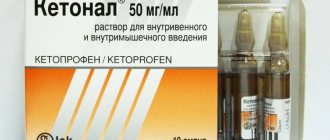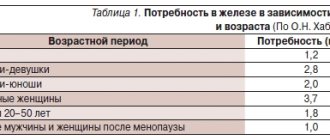Aertal
Use during pregnancy and breastfeeding
Pregnancy
Airtal® is contraindicated during pregnancy. There is no information on the use of aceclofenac during pregnancy.
Inhibition of prostaglandin synthesis may adversely affect the course of pregnancy and/or the development of the embryo/fetus.
During the third trimester of pregnancy, all prostaglandin synthesis inhibitors:
- having cardiopulmonary toxicity, they can cause premature closure of the ductus bollus with the development of pulmonary hypertension;
- may cause impaired fetal renal function, which can progress to renal failure in combination with oligohydramnios.
Late pregnant mothers and newborns:
- the drug may affect the duration of bleeding due to the antiplatelet effect, which can develop even after using very low doses;
- the drug may suppress uterine contractions, leading to delayed labor or prolonged labor.
Lactation
Airtal® should not be taken during breastfeeding. There is no data on the excretion of aceclofenac in human milk; When radioactive 14C-aceclofenac was administered to lactating rats, no noticeable transfer of radioactivity into milk was observed.
Fertility
NSAIDs may affect fertility and are not recommended for use by women planning pregnancy.
Use for liver dysfunction
The drug is contraindicated in patients with severe liver failure or active liver disease.
When treating patients with mild to moderate liver dysfunction, lower doses of aceclofenac should be used. The recommended starting dose is 100 mg/day.
Use for renal impairment
The drug is contraindicated in patients with severe renal failure (creatinine clearance <30 ml/min), progressive kidney disease, confirmed hyperkalemia.
There is no evidence for the need to change the dose of aceclofenac when treating patients with mild to moderate renal impairment, but caution is recommended.
Use in children
The drug is contraindicated in children under 18 years of age. The safety and effectiveness of the drug for the treatment of children and adolescents has not been established.
Use in elderly patients
Caution should be exercised when taking the drug to elderly patients.
special instructions
Avoid using Airtal® simultaneously with other NSAIDs, including selective COX-2 inhibitors.
Adverse events can be reduced by shortening the duration of treatment as much as possible and reducing the dose of the drug to the minimum necessary to achieve control of the symptoms of the disease.
Effect on the gastrointestinal tract
Aceclofenac should be prescribed with caution and under close medical supervision to patients with the diseases listed below, because their course may worsen:
- symptoms indicating gastrointestinal diseases, including the upper and lower gastrointestinal tract;
- a history of ulcer, bleeding or perforation of a stomach or intestinal ulcer in the presence of Helicobacter pylori infection;
- history of ulcerative colitis;
- history of Crohn's disease;
- hematological diseases, systemic lupus erythematosus (SLE), porphyria and hematopoietic disorders.
There have been reports of gastrointestinal bleeding, gastric or intestinal ulceration or perforation of the ulcer, which can lead to death with any NSAID at any time during treatment, with or without alarm symptoms, regardless of a history of serious gastrointestinal complications .
The risk of gastrointestinal bleeding, ulceration, or ulcer perforation is greater when treated with high doses of NSAIDs in patients with a history of gastric or intestinal ulcers, especially if complicated by bleeding or perforation, and in elderly patients. Treatment of these patients should begin with the lowest effective dose. Also, when treating these groups of patients and patients who require concomitant use of low-dose acetylsalicylic acid or other drugs that may increase the risk of gastrointestinal complications, the need for combination therapy with protective drugs (for example, misoprostol or proton pump inhibitors) should be considered. .
Patients with a history of gastrointestinal disease, especially the elderly, should report any unusual abdominal symptoms (especially gastrointestinal bleeding), paying maximum attention to symptoms early in treatment. Caution should be exercised when treating patients receiving concomitant medications that may increase the risk of ulceration or bleeding, such as systemic corticosteroids, anticoagulants such as warfarin, selective serotonin reuptake inhibitors or antiplatelet drugs such as acetylsalicylic acid.
If gastrointestinal bleeding or ulceration occurs in patients taking Airtal®, treatment should be discontinued.
Effect on the cardiovascular system and cerebral circulation
When treating patients with arterial hypertension and/or chronic heart failure, it is necessary to carry out appropriate monitoring and give recommendations, because There are reports of the development of fluid retention and edema during treatment with NSAIDs.
There is evidence to suggest that some NSAIDs (especially in high doses and in long-term treatment) may increase the risk of arterial thrombotic complications (eg, myocardial infarction or stroke). There is insufficient data to exclude this risk when using aceclofenac.
Patients with uncontrolled arterial hypertension, congestive heart failure, established coronary artery disease, peripheral arterial disease and/or cerebrovascular disease should begin treatment with aceclofenac only after an informed decision by the attending physician. Likewise, the indications for long-term treatment in patients with risk factors for cardiovascular disease (eg, hypertension, hyperlipidemia, diabetes mellitus, and smoking) should be carefully assessed before initiation.
Caution and close medical supervision should also be exercised when using aceclofenac in patients with a history of cerebral hemorrhage.
Effect on the liver and kidneys
Treatment with NSAIDs may cause a dose-dependent decrease in prostaglandin synthesis and precipitate renal failure. The importance of prostaglandins in maintaining renal blood flow in patients with impaired cardiac or renal function, liver dysfunction, patients receiving diuretic treatment or recovering from abdominal surgery, and elderly patients should be taken into account.
Caution should be exercised when treating patients with impaired liver or kidney function, as well as patients with other diseases predisposing to fluid retention. In these patients, treatment with NSAIDs may lead to impaired renal function and fluid retention. Caution must also be exercised when using the drug in patients receiving diuretic treatment or, conversely, in patients at risk of hypovolemia. The minimum effective dose should be prescribed and renal function should be regularly monitored. The effect of the drug on renal function is usually reversible after discontinuation of aceclofenac.
Treatment with aceclofenac should be discontinued if deviations from normal liver function tests persist or increase, clinical symptoms consistent with the development of liver failure appear, or other manifestations (eg, eosinophilia, rash) appear.
Hepatitis can develop without previous symptoms.
In patients with hepatic porphyria, the use of NSAIDs may provoke an exacerbation of the disease.
Hypersensitivity and skin reactions
As with the use of other NSAIDs, allergic reactions, including anaphylactic/anaphylactoid reactions, may occur early in the use of the drug. In very rare cases, serious skin reactions have been observed with the use of NSAIDs, including exfoliative dermatitis, Stevens-Johnson syndrome and toxic epidermal necrolysis, some of which can be fatal. Patients are at highest risk of developing these reactions early in treatment, with most reactions occurring within the first month of treatment. At the first sign of skin rash, damage to the mucous membranes or any other symptoms of hypersensitivity, treatment with Airtal® should be discontinued.
In extremely rare cases, chickenpox can cause serious infectious complications of the skin and soft tissues. At the moment, the role of NSAIDs in worsening the course of these infectious complications cannot be excluded. Therefore, it is recommended to avoid the use of Airtal® for chickenpox.
Effect on hematological parameters
Aceclofenac can reversibly inhibit platelet aggregation.
Respiratory system disorders
Caution must be exercised when using the drug in patients with bronchial asthma or with a history of bronchial asthma, because There are reports that NSAIDs may cause bronchospasm in such patients.
Elderly patients
Caution should be exercised when treating elderly patients, because... In this age group, the incidence of adverse events associated with NSAID treatment is increased, especially gastrointestinal bleeding and ulcer perforation, which can lead to death. In addition, older patients are more susceptible to renal, hepatic or cardiovascular failure.
Long-term treatment
It is necessary to carefully monitor all patients receiving long-term treatment with NSAIDs, regularly performing complete blood count, liver and kidney function tests.
Each sachet of Airtal®, powder for oral suspension, 100 mg, contains 2.64 g of sorbitol, which can cause gastrointestinal disorders and diarrhea. Patients with rare hereditary fructose intolerance should not be prescribed this drug.
Airtal®, powder for oral suspension, 100 mg, contains aspartame, a source of phenylalanine. Patients with phenylketonuria should note that each sachet contains 5.61 mg of phenylalanine.
Impact on the ability to drive vehicles and operate machinery
You should refrain from driving vehicles and engaging in other potentially hazardous activities that require increased concentration and speed of psychomotor reactions, because the drug may cause dizziness and other side effects that may affect these abilities.
What does it consist of?
Medicine for pain is available in several forms:
- powder from which it is easy to prepare a suspension;
- pills;
- cream.
The powder is available in a dosage of three grams. Typically sold in packs of twenty bags.
Tablets of one hundred milligrams, sold in packs of twenty and sixty tablets. Uniform white ointment in a sixty gram package.
The main active ingredient is aceclofenac.
Drug combination
If you take the drug together with blood pressure medications and diuretics, the therapeutic effect of these medications may be weakened. If you have diabetes mellitus of the first degree, you should carefully monitor your blood sugar levels while taking the drug. Do not take simultaneously with aspirin, oral contraceptives, medications containing lithium and potassium, cyclosporins, blood thinners.
You should drive carefully while taking Aethral. Possible decrease in concentration.
Who should not be prescribed
"Aertal" is contraindicated in the following conditions:
- peptic ulcer of the stomach and duodenum;
- gastritis in the acute phase;
- allergic manifestations;
- poor blood clotting;
- liver diseases;
- kidney inflammation;
- heart failure;
- minor patients;
- pregnancy.
The ointment is not used for external skin lesions, as well as allergic rashes.
Side effects
Sometimes during treatment with Aertal, undesirable effects appear.
They are expressed as:
- nausea and vomiting;
- ulcerative lesions of the stomach and intestines;
- decreased appetite;
- diarrhea or constipation;
- liver failure;
- headache;
- tremors of the limbs;
- emotional lability;
- overexcitement;
- hearing and vision disturbances;
- kidney dysfunction;
- swelling;
- heart rhythm disturbances;
- hypertension;
- allergic reactions;
- hives;
- Quincke's edema;
- anaphylactic shock.
It is necessary to take the drug very carefully if you have existing stomach problems, as life-threatening gastric bleeding is likely to develop.
Sometimes when taking Aethral, photosensitivity reactions on the skin may occur.
How to take it
The tablets are taken orally and must be taken with meals. Otherwise, stomach problems will arise. Drink with plenty of water. For severe pain, take it once in the morning and once in the evening. If the pain is periodic, take it once.
If you have kidney failure, you should not take this drug without a doctor's supervision. The doctor must assess the patient's condition, the results of glomerular filtration tests and calculate the correct dose. Otherwise, serious complications are possible.
The powder is diluted with water in the indicated dosage and taken orally twice a day. Sometimes patients prefer the drug in liquid form.
The ointment is rubbed into the affected areas of the body three times a day. Squeeze out the cream the size of a pea (two grams).
In case of overdose, increased side effects occur. You need to stop taking it, drink activated charcoal and call for medical help.







